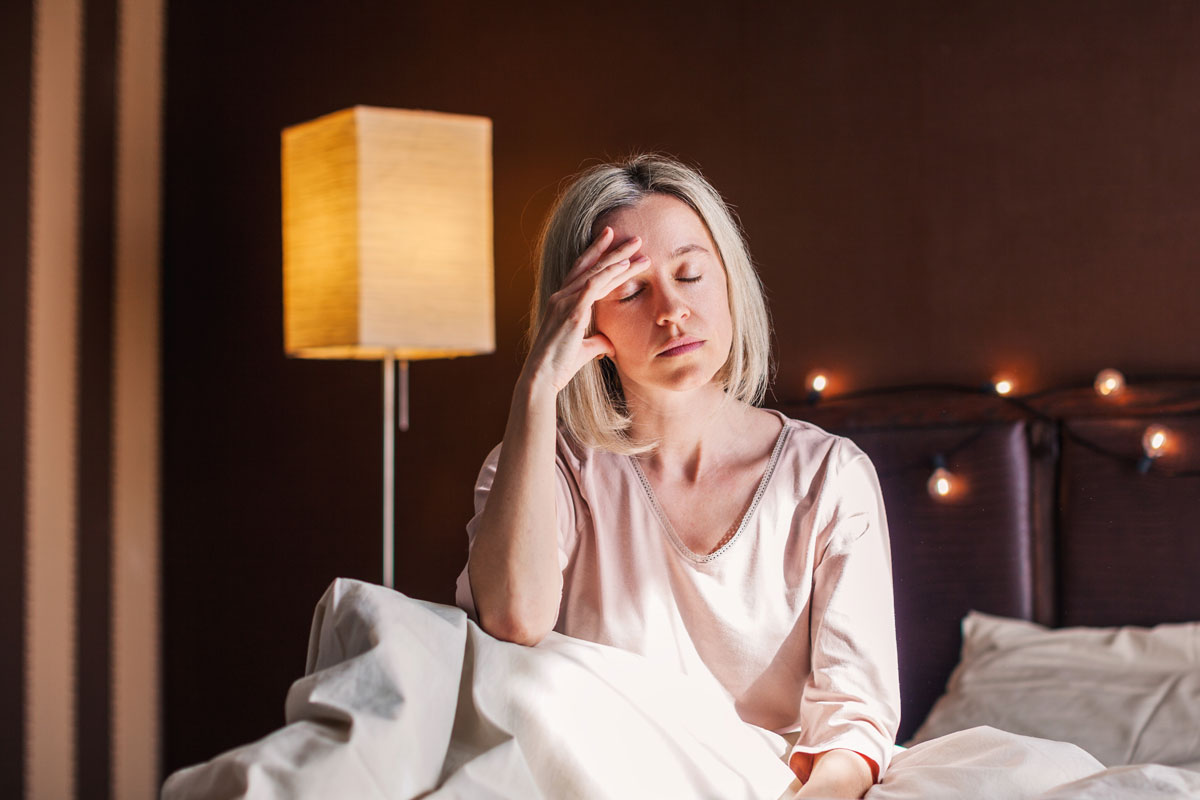
Are you a middle-aged woman whose snoring or sleep quality has worsened? Are snoring and menopause related?
Your hormones – and specifically, menopause – may be to blame.
Snoring differs between women and men – partly due to relative lung size and respiratory function. The upper airway is larger in women, but women are at specific risk for snoring from around age 45-50.
According to the American Sleep Foundation, approximately 12% of women have issues with their sleep, and between their late 40s and early 50s, this number skyrockets to over 40%. For many women, the reason for this is directly linked to perimenopause and menopause. Snoring is one of these concerns. So, what is the link between menopause and snoring?
What is Menopause?
Menopause occurs twelve months after a woman naturally experiences her last menstrual period, or immediately after the surgical removal of her ovaries. Except when induced by surgery or other medical means, it is a gradual process. Perimenopause refers to the years (between seven and ten years on average) leading up to menopause, which for the average Australian woman occurs at age 52-53.
These changes occur as a part of the natural ageing process and signify the end of a woman’s fertile reproductive years. The woman’s ovaries gradually decrease the production of oestrogen and progesterone and stop releasing ova (eggs). Menstrual cycles and bleeding will eventually cease completely.
Perimenopause, menopause, and post-menopause is a time of intense physiological upheaval for most women as the body and brain adjust to these changes, with women experiencing a vast array of symptoms and signs including:
- Hot flushes/flashes
- Mood swings, irritability, and depression
- Vaginal dryness
- Irregular, heavier, or extremely light menstrual bleeding
- Breast tenderness and benign lumpiness/cysts
- Joint and muscle aches and pains
- Insomnia
- Night sweats
- Heart palpitations
- Urethral irritation and urinary urgency
- Changes in libido
- Headaches and migraines
- Hair thinning/loss
- Memory and concentration issues
- Increased health risks, including osteoporosis, heart disease, sleep apnoea, and other conditions.
Some of these symptoms may continue for up to fifteen years after menopause for some women.
Menopause, Hormones, and Sleep
The ovaries stop producing hormones at menopause:
- Oestrogen influences body temperature, as well as serotonin and other neurotransmitters that affect the sleep-wake cycle. It also has an anti-depressant mood impact. The sleep-wake cycle alters with age and becomes more inconsistent.
- Progesterone affects the breathing drive, among other body functions. The breathing drive varies throughout the menstrual cycle, and before menopause, women are somewhat protected against snoring and sleep apnoea. This protection diminishes during menopause.
Furthermore, the stage of life at which women experience menopause can also be stressful for other reasons – emotional concerns about ageing, ageing parents, adolescent children, and others. These stresses all further impact sleep quality.
How Does Menopause Affect Snoring?
Sleep issues are a common sign and symptom of perimenopause and menopause. In particular, night sweats, insomnia, and worsening snoring are directly linked with menopause.
Snoring and sleep apnoea become more common and more severe for women after menopause. Obstructive sleep apnoea (OSA), which is a serious medical condition requiring immediate medical assessment and management, also dramatically increases in incidence from menopause. Medical scientists believe this may be directly linked to lower levels of the hormone progesterone, which is thought to prevent the tissues of the upper airways from relaxing too much. When this relaxation does occur (due, in part, to much lower levels of progesterone), snoring occurs, and lapses in breathing that characterise OSA also result.
Post-menopausal women who use menopausal hormone therapy (MHT) – also called hormone replacement therapy (HRT) – are shown to experience lower rates of OSA, snoring, and better quality sleep.
Ways to Relieve Menopause-Induced Snoring
- Treating menopause symptoms using Estrogen Replacement Therapy or Hormone Replacement Therapy may alleviate snoring in some women – but this must be managed by your doctor. These medication-based treatments can also help prevent osteoporosis and heart disease in postmenopausal women, but they must be used with care and ongoing monitoring and are not suitable for use by all women. Estrogen Replacement Therapy is suitable only for women who have had their uterus surgically removed. All other women who opt for this approach must use Combined Hormone Replacement Therapy which includes both oestrogen and progesterone (as estrogen alone can increase the risk of developing endometrial hyperplasia and cancer). Hormone replacement (especially combined) poses certain risks, including for women who have had blood clots, stroke, heart attack, who are very overweight, smoke cigarettes, or who have had breast, ovarian, or uterine cancer.
- Some women find their sleep quality and other menopausal symptoms improve if they take a low dose of SSRI antidepressants.
- Low doses of melatonin (the body’s natural sleep hormone which decreases with age) can help regulate sleep and improve mood.
- Consuming soy products (rich in phytoestrogens) and having cognitive behavioural may also help alleviate many of the symptoms associated with menopause and thereby improving sleep.
Tips for Better Sleep with Menopause
- Stay hydrated
- Maintain a healthy weight
- Explore with your GP whether hormone replacement is suitable and recommended for you.
- Treat allergies
- Minimise stress and address mood disorders
- Maintain a good sleep schedule and sleep hygiene
- Minimise alcohol consumption
- Don’t smoke or vape – and if you do, quit
SnoreMD – The Easiest Way to Stop Snoring
You must minimise or stop snoring.
SnoreMD can help.
SnoreMD is a mandibular advancement device that has been proven to help snorers worldwide – including women during menopause. Worn in the mouth during sleep, it gently moves the lower jaw slightly forward, helping to open the airways and minimise or stop snoring from occurring.
If you are having trouble sleeping and you are a woman in your 40s or 50s, menopause and associated snoring may explain why. Give SnoreMD a go – and say goodbye to snoring and hello to better quality sleep for your overall health and wellbeing.
Discover for yourself – purchase SnoreMD today. If you have any questions, call us today (07) 5370 9323.


